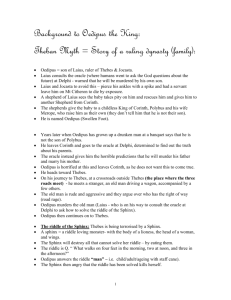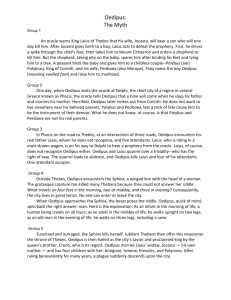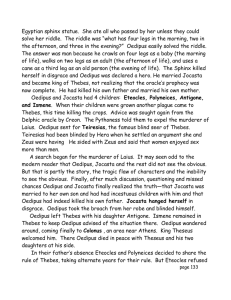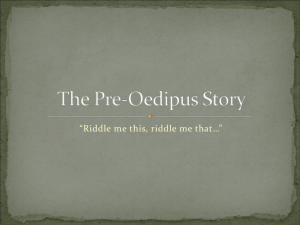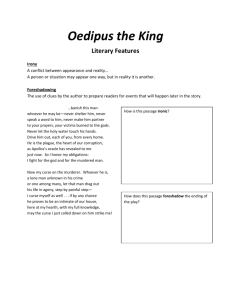oedipus story summary - The Taft School | Haiku Learning
advertisement
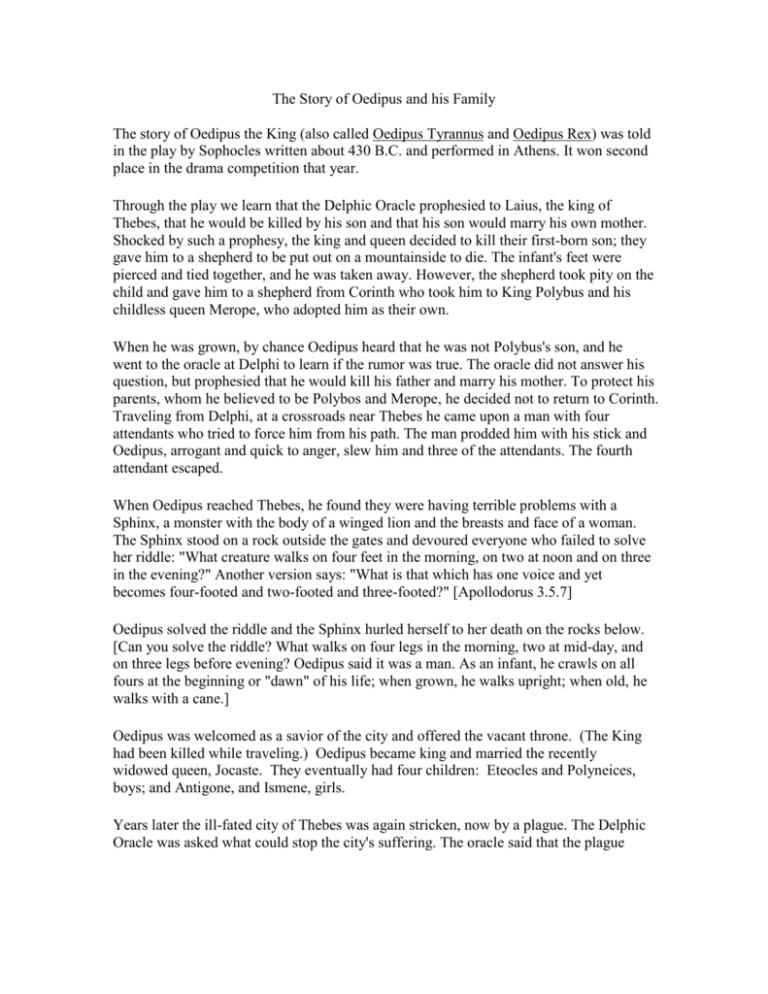
The Story of Oedipus and his Family The story of Oedipus the King (also called Oedipus Tyrannus and Oedipus Rex) was told in the play by Sophocles written about 430 B.C. and performed in Athens. It won second place in the drama competition that year. Through the play we learn that the Delphic Oracle prophesied to Laius, the king of Thebes, that he would be killed by his son and that his son would marry his own mother. Shocked by such a prophesy, the king and queen decided to kill their first-born son; they gave him to a shepherd to be put out on a mountainside to die. The infant's feet were pierced and tied together, and he was taken away. However, the shepherd took pity on the child and gave him to a shepherd from Corinth who took him to King Polybus and his childless queen Merope, who adopted him as their own. When he was grown, by chance Oedipus heard that he was not Polybus's son, and he went to the oracle at Delphi to learn if the rumor was true. The oracle did not answer his question, but prophesied that he would kill his father and marry his mother. To protect his parents, whom he believed to be Polybos and Merope, he decided not to return to Corinth. Traveling from Delphi, at a crossroads near Thebes he came upon a man with four attendants who tried to force him from his path. The man prodded him with his stick and Oedipus, arrogant and quick to anger, slew him and three of the attendants. The fourth attendant escaped. When Oedipus reached Thebes, he found they were having terrible problems with a Sphinx, a monster with the body of a winged lion and the breasts and face of a woman. The Sphinx stood on a rock outside the gates and devoured everyone who failed to solve her riddle: "What creature walks on four feet in the morning, on two at noon and on three in the evening?" Another version says: "What is that which has one voice and yet becomes four-footed and two-footed and three-footed?" [Apollodorus 3.5.7] Oedipus solved the riddle and the Sphinx hurled herself to her death on the rocks below. [Can you solve the riddle? What walks on four legs in the morning, two at mid-day, and on three legs before evening? Oedipus said it was a man. As an infant, he crawls on all fours at the beginning or "dawn" of his life; when grown, he walks upright; when old, he walks with a cane.] Oedipus was welcomed as a savior of the city and offered the vacant throne. (The King had been killed while traveling.) Oedipus became king and married the recently widowed queen, Jocaste. They eventually had four children: Eteocles and Polyneices, boys; and Antigone, and Ismene, girls. Years later the ill-fated city of Thebes was again stricken, now by a plague. The Delphic Oracle was asked what could stop the city's suffering. The oracle said that the plague would end when the murderer of the former King was punished. Oedipus dedicated himself to solve the mystery of the murder and thereby rid the city of its curse.1 He at last discovers that he himself is the murderer, that the man he met at the crossroads and killed was in fact King Laios. He also learns, to his grief, that he is the son of Laios and Jocaste, the baby that was supposed to be killed but given to the royal family of Corinth instead. His name, Oedipus, means “swollen foot,” a reminder of the fact that his ankles were pierced when he was abandoned. Thus in trying to escape the prophecy and protect his parents by leaving Corinth, he assures its coming true with his actual parents. Jocaste, originally his mother and now his wife, learning that she has borne four children with her own son and realizing that their family is cursed, kills herself. When Oedipus rushes to his wife’s side and discovers her dead, he blinds himself in his grief. He is exiled from Thebes, but the rule of the city passes to his two sons, who are supposed to share the throne. Oedipus wanders through Greece, attended by his daughters Antigone and Ismene, until he arrives at Colonus, where he finally dies, miserable because he and his family have been cursed by the gods. Meanwhile, in Thebes, the two brothers come into conflict. Stories differ as to how they end up feuding, but all agree that Eteocles takes over Thebes and Polyneices attacks the city with an army to get his throne back. The battle is finally decided by single combat between the two brothers, who end up killing each other. The rival army retreats, and Creon, Jocasta’s brother and uncle to Oedipus’ children, becomes ruler of Thebes. He declares that Eteocles is a hero for defending the city but that Polyneices is a traitor for attacking. Text up to here taken from http://www.sfusd.edu/schwww/sch618/greeksmultimediaproject/oedipus/oedip us_brief_summary.html, 11/12/2009. 1
